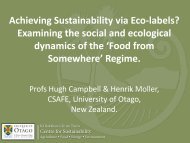Book of Abstract (incl. addendum) - IFSA symposium 2012
Book of Abstract (incl. addendum) - IFSA symposium 2012
Book of Abstract (incl. addendum) - IFSA symposium 2012
Create successful ePaper yourself
Turn your PDF publications into a flip-book with our unique Google optimized e-Paper software.
Workshop 6.3 Organics: their dynamics<br />
productions and processing system organisation, and on farmers' projects and expectations. Transition<br />
to organic farming doesn't always mean a surplus <strong>of</strong> work. Nevertheless it <strong>of</strong>ten causes important work<br />
organisation changes. In many cases, it leads to a new dynamic in which work perception and work<br />
expectations will change and have an influence on farming systems transformations.<br />
Transition to sustainable agriculture: How reframing the meaning <strong>of</strong><br />
organic farming contributed to its growth in Austria<br />
Ika Darnh<strong>of</strong>er and Lee-Ann Sutherland<br />
University <strong>of</strong> Natural Resources and Life Sciences, Austria<br />
Ika.Darnh<strong>of</strong>er@boku.ac.at<br />
Although organic farming has seen a strong growth in the last two decades, in most countries it still<br />
covers only a small share <strong>of</strong> the agricultural land (in the USA: 0.7%, in the EU: 4%). However,<br />
currently in Austria 20% <strong>of</strong> agricultural land is certified organic. The aim <strong>of</strong> this contribution is to<br />
analyse how changing the meaning <strong>of</strong> 'organic' contributed to this development.<br />
To enable a transition, a broad range <strong>of</strong> social, political and technical factors need to align. The<br />
development <strong>of</strong> organic farming in Austria is thus not reduced to an economic explanation (e.g.<br />
subsidies <strong>of</strong>fered). Instead, the complex interplay <strong>of</strong> social norms and values, geo-political<br />
developments, agro-ecological opportunities, entrepreneurial individuals, collective action and<br />
governance structures is analysed. Our analysis is based on the conceptual framework established by<br />
the Dutch School on transitions (Frank Geels, John Grin and others).<br />
The contribution will focus on how the meaning <strong>of</strong> ‘organic farming’ was transformed in the<br />
course <strong>of</strong> the transition and discuss to what extend this transformation <strong>of</strong> meaning was what made<br />
organic farming – originally an alternative production method and thus defined in opposition to<br />
conventional farming – acceptable to the mainstream. Indeed, organic farming needed to become an<br />
attractive opportunity for agricultural policy makers, and acceptable for the societal actors involved in<br />
agriculture (e.g. the chamber <strong>of</strong> agriculture). It also needed to loose its 'müsli' flair (i.e. healthy but<br />
tasteless food) to become appealing to new consumer groups. Through reframing what organic farming<br />
and food means, it became attractive to a wider constituency, allowing it to seize an 'window <strong>of</strong><br />
opportunity' (the fundamental change in agricultural policy linked to the EU-accession <strong>of</strong> Austria). The<br />
analysis will thus show how (the meaning <strong>of</strong>) organic farming was transformed in the course <strong>of</strong> the<br />
transition. Indeed a transition changes the niche as well as the regime.<br />
Soil conservation practices in organic farming : overview <strong>of</strong> french<br />
farmers’experiences and contribution to future cropping systems design<br />
Vincent Lefevre, Mathieu Capitaine, Joséphine Peigne and Jean Roger-Estrade<br />
ABIES AgroParisTech, France<br />
Vlefevre@isara.fr<br />
In organic farming, as crops production is directly depending on the smooth functioning <strong>of</strong> soil,<br />
farmers pay attention to preserve soil ecosystem in order to benefit from better ecological services.<br />
Today, soil conservation practices, as ploughless soil tillage and cover cropping, have gained<br />
prominence in organic cropping systems and provide for great potentials such as maintaining or<br />
increasing soil fertility, saving labour and reducing energy costs.<br />
This paper focus on pioneer organic farmers who integrated or tended to integrate soil<br />
conservation practices into their cropping systems. The aims are (i) to understand how these new<br />
combined practices are managed in relation to farmers’ objectives and constraints and (ii) to identify<br />
difficulties encountered by farmers and how they deal with it. This work provides a reference base for<br />
designing new organic cropping systems.<br />
116











